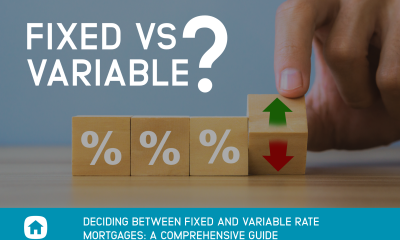(Special) – Financial professionals have been predicting for a long time that historically-low interest rates would not last forever and Canadians were well advised to take control of their finances and start reducing their debt levels.
Well, their predictions have come true. Interest rates have been rising for the past year in Canada as the economy has improved. The latest increase occurred on Oct. 24 when the Bank of Canada announced a .25-per-cent increase in its benchmark rate to 1.75 per cent.
In its November monthly newsletter, BDC predicts more increases are likely in the next 18 months. How high they will go nobody can know for certain, but BDC says most observers do not expect them to spike.
Why are interest rates increasing?
“When the economy is running at full capacity as it is now, there is a risk that inflation will increase above the level the Bank of Canada considers to be healthy for the economy,” BDC says. “As well, stimulus in the form of low central bank interest rates is no longer needed to encourage growth. The combination of these two factors explains why the Bank of Canada is raising rates.”
Leonie Tait, vice president of marketing with Kanetix Ltd., predicts the central bank will continue to raise the benchmark rate slowly and cautiously to between 2.5 per cent and 3.5 per cent.
“People definitely took advantage of low rates to borrow but these rate increases should be a wake-up call to them,” Tait said in an interview. “The impact of rate increases often can take a couple of years to trickle down through the economy, but we would recommend consumers do a stress test to see exactly how much the increases will affect their monthly payments.”
Some Canadian consumers will feel the impact of increased rates almost immediately, such as those who have variable rate mortgages.
A search on ratesupermarket.ca on Nov. 21 found rates and monthly payments for a five-year variable mortgage in the Toronto area ranged from 2.7 per cent/$1,665 per month to 4.15 per cent/$1,816 per month, depending on the lender.
Consumers with variable rate debts will feel the impact of the increase. Tait says just under half of all mortgages in Canada are coming up for renewal in the next year and those who have variable rate mortgages may want to consider switching to a fixed rate.
“It certainly pays to shop around for the best rate but there is an advantage of staying with your existing lender because you are already qualified and don’t have to undergo another stress test, which a new lender likely would have to do,” Tait says.
Credit card interest rates also will be affected and Tait recommends people look at their balances and start paying them off. If you have multiple debts, start paying down those with the highest interest rates first or consolidate all your loans into one at the lowest rate possible.
There are some silver linings, however, with rate increases. Rates on savings accounts will increase and higher mortgage rates tend to have a cooling-off effect on the housing market.
Regardless, consumers need to know how rate increases will affect their monthly finances, because more are coming.
“Everyone is different,” Tait says. “It’s important to understand how rate increases will affect you and your family’s finances so you can make the right decisions.”
Talbot Boggs is a Toronto-based business communications professional who has worked with national news organizations, magazines and corporations in the finance, retail, manufacturing and other industrial sectors.
Copyright 2018 Talbot Boggs
Talbot Boggs , The Canadian Press

 Buying a Home5 years ago
Buying a Home5 years ago
 Credit6 years ago
Credit6 years ago
 Business4 years ago
Business4 years ago
 5 Mortgage Secrets7 years ago
5 Mortgage Secrets7 years ago
 Buying a Home6 years ago
Buying a Home6 years ago
 5 Mortgage Secrets6 years ago
5 Mortgage Secrets6 years ago
 News12 months ago
News12 months ago
 Business4 years ago
Business4 years ago





